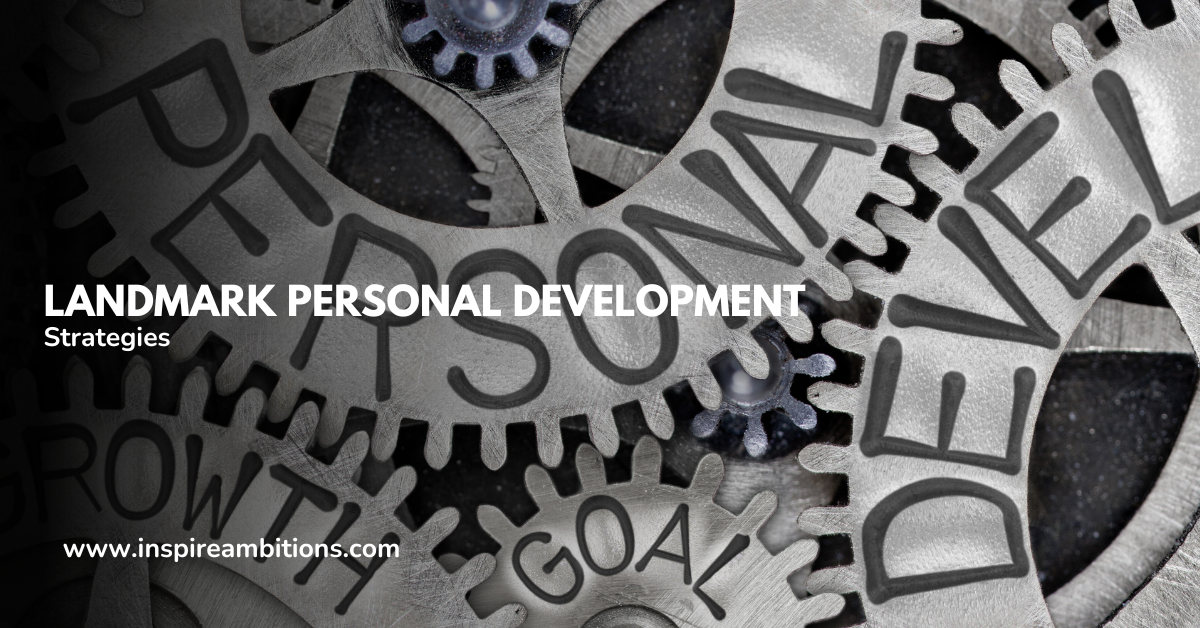ऐतिहासिक व्यक्तिगत विकास - आत्म-सुधार के लिए परिवर्तनकारी रणनीतियाँ
Landmark Worldwide is a San Francisco-based company that offers personal and professional growth, training, and development programmes designed to help individuals produce extraordinary results and enhance their quality of life.
As an industry leader and innovator, their methodology ensures people achieve their maximum potential both personally and professionally.
One of Landmark’s key offerings is the Landmark Forum, a powerful three-day personal development course providing lasting results that continue to expand and improve over time.
By participating in the Landmark Forum, you can experience positive shifts in various aspects of your life, such as the quality of your relationships and the confidence with which you conduct your daily activities.
In addition to the Landmark Forum, the company offers advanced and specialised programmes that enable you to create a भविष्य of your choosing, not constrained by past experiences or limiting beliefs.
Whether you’re new to personal development or looking to expand on your existing knowledge, Landmark Worldwide has offerings catered to your needs and goals.
The Definition of Personal Development
अधिक जानने के लिए पढ़े।
Origin and Evolution
Historically, व्यक्तिगत विकास traces its roots back to ancient philosophies and religious teachings, which aimed at helping individuals achieve self-awareness and personal growth.
Over time, this concept has evolved to incorporate various disciplines, including psychology, education, sociology and even business management.
As society progressed, the idea of personal development shifted from being purely based on spiritual growth to encompassing the entire spectrum of human potential. In recent times, the emphasis has been on building self-awareness, enhancing skills, and achieving goals with a holistic approach.
Current Concept and Relevance
Personal development, in its modern sense, refers to a set of activities undertaken to improve one’s capabilities, potential, and overall quality of life. It involves fostering self-awareness, enhancing employability, building human capital, and facilitating the realisation of dreams and aspirations.
In today’s fast-paced world, personal development has become increasingly relevant, as it equips individuals to adapt and thrive in a constantly changing environment.
By fostering a growth mindset and honing valuable skills, personal development enables you to enhance your performance, productivity, and overall satisfaction with life. Additionally, it plays a crucial role in promoting mental well-being and developing better relationships with others.
In summary, personal development offers a pathway to self-improvement and self-awareness, enabling you to navigate life’s challenges and achieve your full potential. Embracing personal growth can not only improve your personal and professional life but also contribute positively to the well-being of society as a whole.
Landmark Models in Personal Development
In this section, we will explore three prominent theories in the field of personal development, providing you with a solid understanding of their relevance to the Landmark Worldwide approach. We will discuss Maslow’s Hierarchy of Needs, Erikson’s Stages of Psychosocial Development, and Freud’s Psychoanalytic Theory.
आवश्यकताओं का मैस्लो का पदानुक्रम
Maslow’s Hierarchy of Needs is a motivational theory that suggests human needs can be organised into a five-tier pyramid. From the most basic physiological needs to the highest level of self-actualisation, each progressive stage must be met for overall well-being. The levels of the pyramid include:
- Physiological needs: Breathing, food, water, sleep
- Safety needs: Security, stability, protection
- Social needs: Love, belonging, acceptance
- Esteem needs: Achievement, recognition, confidence
- Self-actualisation: Realising potential, creativity, personal growth
As you engage in Landmark programs, you will develop and improve various aspects of your life, addressing these hierarchical needs with the goal of reaching a fulfilled, balanced, and thriving state.
Erikson’s Stages of Psychosocial Development focuses on the impact of social interactions in shaping human identity throughout eight distinct stages in life. Each stage presents a conflict or challenge that contributes to personal growth and self-awareness. The stages include:
- Trust vs. Mistrust
- Autonomy vs. Shame and Doubt
- Initiative vs. Guilt
- Industry vs. Inferiority
- Identity vs. Role Confusion
- Intimacy vs. Isolation
- Generativity vs. Stagnation
- Integrity vs. Despair
Through transformative learning experiences in Landmark’s personal development courses, you will identify and resolve conflicts you may face in these stages, improving your ability to navigate life’s challenges and ultimately strengthening your sense of self.
Freud’s Psychoanalytic Theory
Freud’s Psychoanalytic Theory postulates that human behaviour and personality are influenced by conscious and unconscious processes. The theory is based on three primary structures of the human psyche:
- Id: Instinctual, pleasure-driven desires
- Ego: Balances the Id’s desires with societal norms and expectations
- Superego: Moral compass influenced by external ideals and values
By engaging with Landmark’s programs, you will gain a deeper understanding of your psyche as well as uncover and examine any unconscious patterns which may affect your thinking and behaviour. As a result, you can develop a healthier relationship with yourself and others.
The Impact of Personal Development
In today’s fast-paced world, personal development plays a significant role in shaping your overall growth.
Individual Perspective
By participating in personal development programmes, like the Landmark Forum, you can enhance your communication skills, decision-making abilities, and productivity. This, in turn, results in improved self-awareness, self-esteem, and a greater sense of fulfilment in your personal and professional life.
As you progress through your personal development journey, you will likely notice better focus, resilience, and adaptability. These qualities enable you to respond to challenges, grow from setbacks, and build meaningful relationships with others.
Societal Perspective
The positive effects of personal development do not end with you. It also has a profound influence on society. As individuals gain a deeper understanding of themselves, they may develop greater empathy and compassion for others. This, in turn, nurtures more harmonious interactions and cooperation among people.
Moreover, the improvement in communication skills and decision-making abilities contribute to the betterment of the community. Better communication fosters understanding and cooperation in diverse environments, while sound decision-making techniques enable effective collaboration on shared goals.
Furthermore, personal development has the potential to inspire innovation and entrepreneurship. As individuals become more open to new ideas and opportunities, they may contribute to the creation of groundbreaking solutions and services that address pressing societal issues.
In essence, the impact of personal development is multi-faceted, benefiting not only you but also the broader community. Embrace the journey to enrich both your life and that of those around you.
The Process of Personal Development
Personal development goes through the following process:
आत्म प्रतिबिंब
To embark on your personal development journey, it is crucial to begin with self-reflection. This involves evaluating your strengths, weaknesses, and areas for improvement. It’s important to be honest with yourself during this process to achieve genuine growth.
Take the time to analyse your thoughts, feelings, and experiences, as this will help you to identify patterns and potential areas for development.
लक्ष्य की स्थापना
Once you have a clear understanding of your current state, set realistic goals for improvement. These goals should be specific, measurable, achievable, relevant, and time-bound (SMART).
By setting SMART goals, you increase the likelihood of success and help maintain motivation. It’s important to remember that personal development is an ongoing process, so don’t be disheartened if you don’t immediately reach your desired outcomes.
Action and Monitoring
With your goals in place, it’s time to take action. Create an action plan detailing the steps you’ll take to achieve your objectives. Break down larger goals into smaller, more manageable tasks. This will help you maintain focus, prevent overwhelm, and make progress more achievable.
As part of the action process, it’s essential to consistently monitor your progress. This can be done through regular self-assessments, feedback from peers, or reflection on your experiences.
Monitoring your progress will help you identify any obstacles, refine your action plan, and ultimately, enhance the effectiveness of your personal development efforts.
Remember, Rome wasn’t built in a day. Personal development is a lifelong endeavour, so be prepared to continually assess, adapt, and grow as you progress on your journey.
Challenges of Personal Development
Personal development does not come without challenges, which are:
प्रतिरोध पर काबू पाना
It’s natural for you to encounter resistance when embarking on your personal development journey. Resistance can stem from your existing habits, fear of change, or merely a lack of motivation. To overcome this resistance, identify the cause and implement strategies to address it. Some useful techniques include:
- Setting realistic short-term and long-term goals
- Surrounding yourself with supportive and like-minded individuals
- Establishing a daily routine to foster positive habits
- Utilising positive reinforcement to keep yourself motivated
Breaking through the barrier of resistance is essential for you to make progress in your personal development journey.
असफलता से निपटना
Inevitably, you will face setbacks and failures along the way. It’s crucial to accept that failure is a natural part of growth and can provide valuable lessons. To effectively deal with failure:
- Acknowledge the setback and permit yourself to feel disappointed.
- Analyse the failure to identify its root cause. Be honest with yourself about your weaknesses or any external factors that contributed to the failure.
- सीखना from the experience. Elicit critical lessons and use them to improve your future actions.
- आवेदन करना these lessons to ensure you don’t repeat the same mistake.
By adopting a resilient mindset and viewing failure as a learning opportunity, you’ll develop the mental fortitude to continue your personal development journey effectively. Keep in mind that fostering a growth mindset will help you embrace challenges and learn from setbacks.
The Future of Personal Development
Learn what the future holds:
Emerging Trends
In recent years, there has been an increasing emphasis on mental well-being and the role it plays in personal development. As you continue on your growth journey, you can expect to see a greater focus on mindfulness practices, self-reflection, and emotional intelligence.
These trends will not only help you better understand your emotions but also improve your ability to communicate and empathise with others.
Additionally, technology and digital resources will play a more significant role in personal development.
You can soon find a vast array of ऑनलाइन पाठ्यक्रम, mobile apps, and digital resources designed to support your growth. These tools will make learning and self-improvement accessible to you anytime, anywhere.
Predicted Evolution
As personal development strategies continue to evolve, we can anticipate a shift towards more personalised development programmes. These tailored programmes will consider your unique capabilities, aptitudes, and learning styles to optimise your growth potential.
Consequently, you will see an increase in customised coaching and mentoring services that allow for more individualised guidance and support.
Furthermore, the future of personal development will likely emphasise the importance of work-life balance and its impact on productivity and mental well-being.
You can expect companies to promote this balance to improve employees’ job satisfaction and personal growth opportunities. In turn, this could lead to the creation of innovative workshops and training sessions that promote emotional intelligence and stress resilience.
In summary, the future of personal development will be marked by new trends and an evolution in strategy, with a strong emphasis on mental well-being, technological advancements, and personalisation.
As you continue to grow and develop, these advancements will undoubtedly provide valuable tools and insights to help you reach your full potential.







